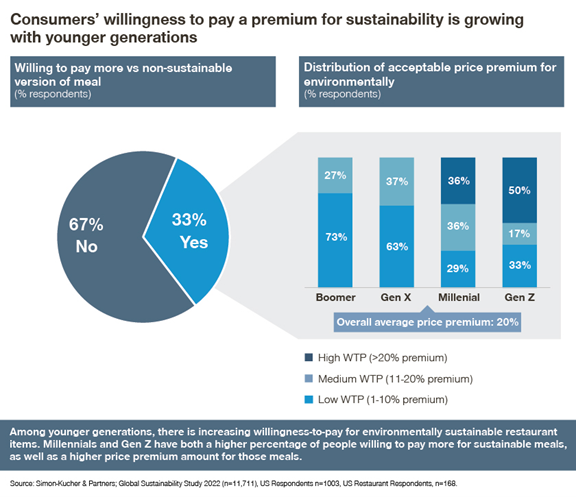The restaurant industry, particularly the fast-food sector, is increasingly embracing sustainability as a key priority. By adopting eco-friendly practices, restaurants are minimizing their environmental impact, lowering operational costs, and appealing to eco-conscious customers. A major focus has been sourcing local and seasonal produce, which reduces transportation emissions and supports local farmers. Additionally, many are prioritizing sustainably caught or farmed seafood to help protect marine ecosystems. Efforts to reduce waste are also gaining traction, including strategies like precise portion control, proper storage, and creative menu planning. Some restaurants are taking it a step further by composting food scraps, aiming to decrease landfill waste and create nutrient-rich soil.
Restaurants are also focusing on energy efficiency and sustainable packaging. They are investing in energy-efficient kitchen equipment, lighting, and water-saving measures like low-flow fixtures and efficient dishwashers. Many are exploring renewable energy options, such as solar power. On the packaging front, businesses are reducing materials for takeout and delivery, opting for recyclable or compostable options, and encouraging customers to bring reusable containers.
Sustainability is vital in the restaurant industry because it reduces carbon footprints, conserves resources, and minimizes waste. These efforts not only lower energy and water bills, and reduce waste disposal costs, but also attract environmentally conscious consumers, boost brand image and customer loyalty, and ensure compliance with environmental regulations.

Case Studies: Leading the Way in Sustainability
Chipotle Mexican Grill
Chipotle Mexican Grill has been a leader in the fast-casual restaurant industry, known for its commitment to using fresh, quality ingredients. In recent years, the company has made significant strides in sustainability. Prioritizing responsible and ethical sourcing, Chipotle works with farmers who utilize sustainable farming practices to minimize harmful chemicals and antibiotics. Whenever possible, Chipotle sources ingredients from local farmers and producers, reducing the carbon footprint associated with transportation. Due to the company’s commitment to animal welfare, Chipotle sources meat from suppliers that meet high standards of animal care.
The company is also focused on reducing its environmental impact. Chipotle implements composting and recycling programs in many of its restaurants to reduce waste sent to landfills. It also focuses on energy-efficient restaurant design and operations to minimize its carbon footprint, and is working to reduce water usage in its restaurants and supply chain.
By focusing on these areas, Chipotle is not only providing quality food but also making a positive impact on the environment and the communities it serves. Chipotle’s commitment to sustainability has earned the company recognition and praise from customers and industry experts alike.
Starbucks Corporation
Starbucks Corporation, an American multinational chain of coffeehouses and roastery reserves, has made significant strides in sustainability across various areas, including environmental impact, ethical sourcing, and community engagement. The company aims to reduce its carbon emissions by 50% by 2030. It has achieved 100% renewable energy coverage for its US stores since 2015 and is continuously implementing innovative solutions like electric vehicle (EV) charging stations and energy-efficient store designs.
The company is committed to conserving water and reducing its water footprint. Starbucks has implemented water-saving technologies in its stores and supports sustainable water practices in coffee-growing regions. It is working toward a circular economy by reducing waste and promoting recycling. Starbucks has introduced reusable cup programs and is constantly exploring ways to minimize packaging materials. The company is committed to ethical coffee bean sourcing. It has implemented the Coffee and Farmer Equity (CAFE) Practices program to ensure fair labor practices, environmental protection, and community development in coffee-growing regions. In addition, Starbucks provides training and resources to farmers to improve their livelihoods and promote sustainable farming practices. The company also invests in community development projects in coffee-producing countries.
McDonald’s
McDonald’s, a global fast-food giant, has been making significant strides in its sustainability journey. The company has implemented a comprehensive program to ensure sustainable beef sourcing, focusing on responsible ranching practices, water conservation, and reducing greenhouse gas (GHG) emissions. In addition, McDonald’s is sourcing 100% certified sustainable palm oil to address deforestation and biodiversity loss associated with palm oil production. The company is also working with its suppliers to improve chicken welfare, and reduce the use of antibiotics important to human medicine.
Sustainability initiatives are focused on packaging, energy efficiency, and waste reduction. The company is focused on reducing packaging waste by using less material and optimizing packaging designs. McDonald’s encourages recycling initiatives across its restaurants and promotes the use of recyclable materials. The company is also exploring the use of renewable and recycled materials in its packaging.
McDonald’s has implemented energy-efficient designs in its new restaurants, including LED lighting, high-efficiency HVAC systems, and water-saving technologies. In addition, the company is exploring opportunities to use renewable energy sources like solar and wind power to reduce its carbon footprint. Finally, McDonald’s has implemented programs to reduce food waste, such as donating surplus food to local charities, and using food waste for composting or animal feed.
The Benefits of Sustainability for Restaurants
In conclusion, sustainability is essential for the restaurant industry for several compelling reasons. Implementing sustainable practices like reducing food waste and conserving energy not only protects the planet but also drives cost savings and operational efficiency. Eco-conscious consumers are increasingly drawn to sustainable restaurants, offering an opportunity to stand out from competitors and strengthen brand reputation. Beyond environmental and financial advantages, sustainability creates meaningful social impact. By sourcing local ingredients, restaurants support local economies and generate jobs. These efforts also promote a sense of community and shared responsibility, contributing positively to society as a whole.


